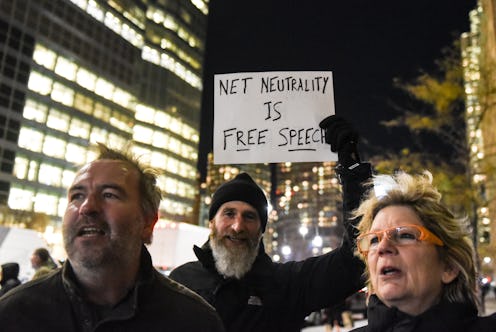News
California Has A Brilliant Plan To Bring Back Net Neutrality

Against much public outcry, the Federal Communications Commission ruled yesterday to repeal what's known as net neutrality — a policy that essentially prohibits internet service providers from privileging some content over others. The party-line FCC vote was loudly decried by various groups and individuals in favor of net neutrality, among them Democratic State Senator Scott Wiener. He announced a California net neutrality bill on Thursday, arguing that "we must have a free and open internet."
Wiener first disclosed his planned California state legislation on a Medium post following the FCC disbandment of net neutrality rules. In his announcement, Wiener takes clear aim at what he sees as threats to American democracy. "We can’t have an Internet that favors access for those who pay to boost their web traffic or, worse, that blocks websites because they aren’t willing to shell out money," Wiener argued. He also cited the constant attacks on the press from an "authoritarian age" in Washington, D.C., as reason to support net neutrality rules.
The state legislature will reconvene in January. Over the next 60 days, Wiener will be working to put his bill together, and wrote that he would welcome input on how to best construct statewide net neutrality regulations in California.
Wiener lists several possible ways the Golden State could implement its own net neutrality. As he outlined in his Medium announcement:
California can regulate business practices to require net neutrality, condition state contracts on adhering to net neutrality, and require net neutrality as part of cable franchise agreements, as a condition to using the public right-of-way for internet infrastructure, and in broadband packages.
Outside of a state-by-state net neutrality requirement, those in favor of the policy do have two other avenues to success: Congress and the courts.
Congress has considered the issue of net neutrality before. In 2015, congressional Republicans actually tried to move forward a kind of net neutrality legislation, hoping to limit the FCC's expected ruling to instate net neutrality back then. And after the FCC announced its net neutrality game plan, the GOP considered writing a bill to address the main concern of supporters — that without net neutrality, internet service providers would split content into "fast lanes" and "slow lanes" and maybe even block certain sites altogether. In doing so, Republicans had hoped to trade guaranteed equal content service for a reduced role in how the federal government could regulate the internet going forward.
But Republicans' net neutrality legislation never made it to the floor.
Now, net neutrality enthusiasts are looking to Congress for a way out of the FCC’s recent ruling. And even for some resistant to or neutral on the subject of net neutrality, Congress is the right place from a legal standpoint to debate and protect government regulation of the internet.
Another potential way around the FCC would be the court system. Michael J. Coren writes at Quartz that opponents of the FCC say their net neutrality ruling "is riddled with procedural and substantive errors that will sink its enactment in federal courts."
And that's not the only legal battle that the FCC might face over net neutrality. Several state attorneys general are looking into what they say is a massive scam in public comments received by the FCC on their proposed rule change. The agency was inundated with 21 million comments, many of which investigators say look like they were written and submitted by bots. In a letter to the FCC signed by 18 attorneys general, they wrote, "This is akin to identity theft on a massive scale and theft of someone’s voice in a democracy is particularly concerning.”
Between Wiener's proposed statewide net neutrality for California, the possibility of Congress getting involved, and legal challenges to the FCC already in motion, net neutrality may not be gone for long.